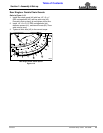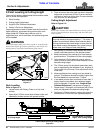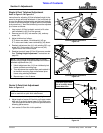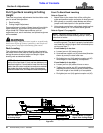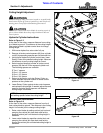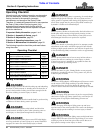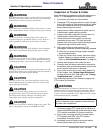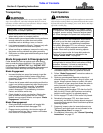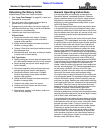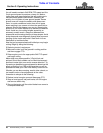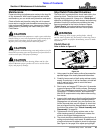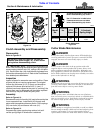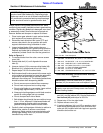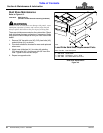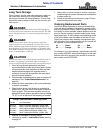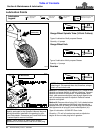
27
Section 3: Operating Instructions
12/15/15
RCF2784 Rotary Cutters 326-364M
Table of Contents
Unhooking the Rotary Cutter
Unhook Rotary Cutter from tractor as follows:
1. S e e “Long Term Storage” on page 33 if cutter is to
be stored for a long time.
2. Park on a level solid surface and lower deck to
ground level or onto support blocks.
3. Engage tractor park brake, shut tractor engine off,
and remove switch key. Stay on tractor until blades
have come to a complete stop.
4. Unhook cutter from tractor as follows:
3-Point Cutter:
a. Disconnect driveline from tractor. Collapse
driveline by pushing tractor end of driveline
towards cutter gearbox.
b. Rotate driveline storage hook down and place
driveline in storage hook.
c. Unhook 3-Point hitch from tractor and drive tractor
forward several feet.
d. Reinstall hitch pins, linch pins, and hair pin cotters
in cutter hitch for safe keeping.
Pull-Type Cutter:
a. Attach parking jack to hitch stob with detent hitch
pin. Make certain detent hitch pin is fully inserted.
b. Adjust parking jack up until cutter weight is off
tractor drawbar.
c. Disconnect hydraulic hose and loop hose back
through spring hose loop for safe keeping.
d. Disconnect driveline from tractor. Collapse
driveline by pushing tractor end of driveline
towards cutter gearbox.
e. Rotate driveline storage hook down and place
driveline in storage hook.
f. Unhook hitch safety chain from tractor.
g. Unhook clevis from tractor and drive tractor
forward several feet.
h. Reinstall bolt, washers, lock washer, and nut in
clevis for safe keeping.
General Operating Instructions
It is important that you familiarize yourself with the
Operator’s Manual, completed Operator’s Checklist,
properly attached cutter to your tractor, made leveling
adjustments, and preset your cutting height before
beginning a running operational safety check on your
Land Pride Rotary Cutter.
The running operational safety check may now be done.
It is important that at any time during this safety check
you detect a malfunction in either the cutter or tractor that
you immediately shut the tractor off, remove its key, and
make necessary repairs and/or adjustments before
continuing on.
Make sure before starting the tractor that the park brake
is engaged, PTO is disengaged, and cutter is resting on
the ground. Start tractor and set engine throttle speed at
a low idle. Raise cutter with tractor’s rear hydraulic lift
control lever to transport position making sure that the
driveline does not bind and does not contact the cutter
frame. Lower cutter to the ground and at a low engine
speed engage the PTO. If everything is running smoothly
at a low idle, slowly raise cutter to cutting height checking
for bind or chatter in the driveline. Lower the cutter to the
ground and increase the tractor’s engine RPM until it
reaches the cutter full PTO operating speed of 540 RPM.
If everything is still running smoothly, once more raise the
cutter to cutting height to check for driveline bind or
chatter. Lower the cutter to the ground, return engine to a
low idle, and disengage PTO. Position adjustable stops
on the tractor’s hydraulic lift lever or the Pull-Type
hydraulic cylinder rod so the cutter can be consistently
returned to the same cutting and transport height.
You should now be ready to transport to your cutting site
at a safe ground speed. On roadways transport in such a
manner that faster moving vehicles can easily see you
and pass you safely. Reduce your speed when travelling
over rough and hilly terrain. Avoid quick or sharp steering
corrections. Take extra care to ensure that the mower
doesn’t come into contact with obstacles such as trees,
buildings, or fences. Use accessory lights and
appropriate reflective devices to provide adequate
warning to pedestrians and other vehicle operators when
traveling on public roads and in the dark of night. Comply
with all local, state, and federal laws.
It is important that you inspect the area where you will be
cutting and clear it of safety hazards and foreign objects
either before or after you arrive at the cutting site. Never
assume the area is clear. Cut only in areas you are
familiar with and are free of debris and unseen objects.
Extremely tall grass should be cut twice to detect
potential hazards. In the event you do strike an object
stop the cutter and tractor immediately to inspect and
make necessary repairs to the cutter before resuming
operation. It really pays to inspect a new area and to
develop a safe plan before cutting.



